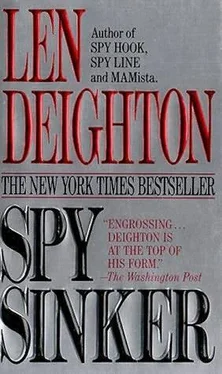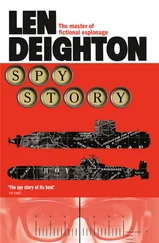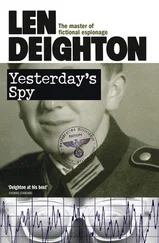Len Deighton - Spy Sinker
Здесь есть возможность читать онлайн «Len Deighton - Spy Sinker» — ознакомительный отрывок электронной книги совершенно бесплатно, а после прочтения отрывка купить полную версию. В некоторых случаях можно слушать аудио, скачать через торрент в формате fb2 и присутствует краткое содержание. Жанр: Триллер, на английском языке. Описание произведения, (предисловие) а так же отзывы посетителей доступны на портале библиотеки ЛибКат.
- Название:Spy Sinker
- Автор:
- Жанр:
- Год:неизвестен
- ISBN:нет данных
- Рейтинг книги:4 / 5. Голосов: 1
-
Избранное:Добавить в избранное
- Отзывы:
-
Ваша оценка:
- 80
- 1
- 2
- 3
- 4
- 5
Spy Sinker: краткое содержание, описание и аннотация
Предлагаем к чтению аннотацию, описание, краткое содержание или предисловие (зависит от того, что написал сам автор книги «Spy Sinker»). Если вы не нашли необходимую информацию о книге — напишите в комментариях, мы постараемся отыскать её.
Spy Sinker — читать онлайн ознакомительный отрывок
Ниже представлен текст книги, разбитый по страницам. Система сохранения места последней прочитанной страницы, позволяет с удобством читать онлайн бесплатно книгу «Spy Sinker», без необходимости каждый раз заново искать на чём Вы остановились. Поставьте закладку, и сможете в любой момент перейти на страницу, на которой закончили чтение.
Интервал:
Закладка:
'It is overdue, Frau Direktor Samson.'
Renn had been surprised at the way in which Fiona had settled in to her Berlin job. He didn't realize to what extent Fiona's English background had prepared her for the communist regime. Her boarding school had very quickly taught her to hide every human feeling: triumph, disappointment, glee, love or shame. Her authoritarian father had demonstrated the art of temporizing and the value of the soft reply. Her English middle-class background – with its cruel double-meanings, oblique questions and humiliating indifference – had provided the final graduation that amply fitted her for East Berlin's dangers. And of course Renn had no inkling of Fiona's bouts of depression, her ache for her children and the hours of suicidal despair and loneliness.
Hair drawn back in a style that was severe and yet not unbecoming, her face scrubbed and with very little make-up, Fiona, with the slight Berlin accent that she now applied to her everyday speech, had become accepted as a regular member of the KGB/Stasi team. Her office was not in the main building in Normannenstrasse, Berlin-Lichtenberg. As Renn had pointed out, to be one of the horde coming out of that big Stasi building at the end of the day's work, to fight your way down into the Magdalenenstrasse U-Bahn and wait for a train, was not something to yearn for.
There were many advantages to being in Karl Liebknecht Strasse. It was in the Mitte, only a stone's throw from the shops, bars and theatres, and Unter den Linden ran right into it. What the cunning old Hubert Renn really meant of course was that it was near the other government offices to which he had to go on foot, and convenient to the Alexanderplatz S-Bahn which took him home.
'I ordered a car for fourteen-thirty,' said Renn. He stopped to admire the fur-lined coat that Fiona had just bought. Not wanting to attract too much speculation about her finances, Fiona had debated about what sort of winter coat she should wear. Hubert Renn had solved the problem by getting permission for her to buy, with DDR currency, one of the fancy coats normally only on sale to foreign visitors. 'You have a meeting at the clinic for nervous diseases at fifteen hundred,' said Renn. 'I'll make sure the driver knows where to go. Pankow: near where the Autobahn ends. It's a maze of little streets: easy to get lost.'
'Thank you, Herr Renn. Do we have an agenda?'
Renn looked at her with an expression she didn't recognize. 'No agenda, Frau Direktor. Familiarization visit. You are meeting with Doktor Wieczorek.'
'Can't the doctor come here?'
Renn busied himself with some papers that were on the filing cabinet. 'It is usual to go there,' he said stiffly and without turning to look at her.
She was about to say that it all sounded very mysterious and make a joke of it, but she had learned that jokes of that sort did not go down well in the East. So she said, 'Do I need to take papers or files with me?'
'Only a notebook, Frau Direktor.'
'Will you not be there to take notes?' She was surprised by this development.
'I am not permitted to attend the meetings with Doktor Wieczorek.
She looked at him but he didn't turn round to meet her eyes. 'In that case,' she said, 'perhaps I'll take an early lunch. By the way, Herr Renn…'
'Yes, Frau Direktor?'
'There is a doctor, Henry Kennedy… Here, I'll write that down for you.' She passed him the slip of paper and he read it carefully as if he might discover some hidden meaning in the name. 'He is from London; working at the Charité on a year's contract…'
'Yes, Frau Direktor?'
'For a year's residence he would have been screened, wouldn't he?'
'Yes, Frau Direktor.'
She wanted the next bit to sound as casual as possible. 'Could you let me see the file?'
'It wouldn't be kept in this building, Frau Direktor.' She looked at him. 'But I could look it up.'
'I don't really need the file or even a copy.'
'You just need to know that there are no complications,' offered Renn.
'Exactly, Herr Renn. He is someone I know socially; I will have to see him from time to time.'
'All is clear, Frau Direktor.'
Pankow has long been one of the most desirable residential districts of the central part of Berlin. This was where smartly dressed East Germans arrived to dinner parties in imported cars! And here, Fiona had discovered to her great surprise, there were households that boasted live-in domestic help.
But the clinic was not in the most salubrious part of Berlin-Pankow. It was a three-storey building in imitation marble. Its bleak neo-Renaissance style, monumental proportion and the pockmarks of wartime artillery damage suggested that it was a surviving example of Berlin's Third Reich architecture.
She was glad of her beautiful fur-lined coat. It was snowing: large flakes that came spinning down like discs and made loud crunching noises underfoot. The temperature had dropped with a suddenness that caught even the residents off guard, and the streets were quiet.
The driver found the clinic without any trouble. There was a wall around the building and a tall gate that opened for her car. The ornamental entrance doors surmounted a wide flight of stone steps with a relief, suggesting columns, on each side of it.
The lobby was lit by soft grey light that came from clerestory windows, set deep into the wall above the entrance. Its floor was an intricate mosaic, depicting Roman maidens broadcasting flowers, and the doors on every side were closed. Doktor Wieczorek's name was painted on a wooden plaque and inserted, together with those of other senior medical staff on duty that day, into a large board on the wall behind the reception desk.
'Yes?' The receptionist was a young man with black hair upon which he'd used a generous amount of hair cream. He wore a washable grey linen jacket, a white shirt and black tie. It was a kind of uniform. He was writing something in a ledger and didn't look up.
'Doktor Samson,' said Fiona. The profound trust that Germans showed for doctorates of any sort had persuaded her to start using her academic qualification.
'Your business?' The young man still didn't look up.
'Stand up when you talk to me!' said Fiona. She didn't raise her voice but the tone was enough to remind the young man that a visitor from the Stasi was expected this afternoon.
He leapt to his feet as if scalded and clicked his heels. 'Ja, Frau Doktor.'
'Take me to Doktor Wieczorek.'
'Doktor Wieczorek… Herr Dok Dok Dok…' said the young man, stuttering and red-faced.
'Immediately. I am on State business,' said Fiona.
'Immediately, Frau Doktor. Yes, immediately.'
Doktor Wieczorek was an elegant forty-year-old specialist who had spent time in the Serbsky Institute of Forensic Psychiatry in Moscow and at the well-known mental hospital which was a part of the Chernyakhovsk prison. He had wavy hair that was beginning to grey at the temples, and a manner that suggested consummate medical expertise. Under his white jacket he wore a smart shirt and silk tie. His firm voice and avuncular manner relaxed her immediately, and so did his readiness to make little jokes about the bureaucracy that he constantly faced and so seldom defeated. 'Coffee?'
'No thank you,' said Fiona. There had been an attempt to make the austere little office look homely with the addition of an oriental carpet and an antique clock that chimed the hours.
'Tea? Tea with milk?' He smiled. That was the only thing I could remember about the British when I was a child: the way they poured cold milk into their tea and ruined it. No? Well we'll get on with this "familiarization visit". There is not a great deal to see in the building. At present we have twenty-three patients, one of whom I expect to be able to send home in a month or two. Some, I'm afraid, will never go home, but in the matter of clinical psychiatry I am always reluctant to say there is no hope.' He smiled at her. 'Do you know what we do here?'
Читать дальшеИнтервал:
Закладка:
Похожие книги на «Spy Sinker»
Представляем Вашему вниманию похожие книги на «Spy Sinker» списком для выбора. Мы отобрали схожую по названию и смыслу литературу в надежде предоставить читателям больше вариантов отыскать новые, интересные, ещё непрочитанные произведения.
Обсуждение, отзывы о книге «Spy Sinker» и просто собственные мнения читателей. Оставьте ваши комментарии, напишите, что Вы думаете о произведении, его смысле или главных героях. Укажите что конкретно понравилось, а что нет, и почему Вы так считаете.












